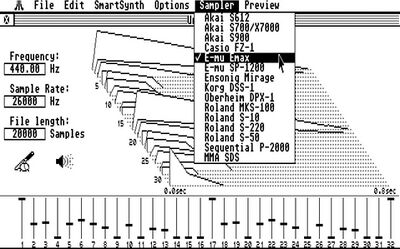Softsynth: Difference between revisions
No edit summary |
No edit summary |
||
| (18 intermediate revisions by the same user not shown) | |||
| Line 1: | Line 1: | ||
| − | '''[http://www.atarimagazines.com/startv3n3/softsynth.html Softsynth]''' by Digidesign was ported in |
+ | '''[http://www.atarimagazines.com/startv3n3/softsynth.html Softsynth]''', aka Softynth ST by Digidesign was ported in 1988 from the Mac. It is a 'Sound Generator', and arguably the first for the Atari TOS platform. This means you can create sounds, and edit them to send via MIDI to the likes of the Akai S700, Akai X7000, Akai S900, Akai S612, Korg DSS-1, Ensoniq Mirage and Sequential Circuits Prophet 2000 Samplers for example. In fact a total 15 Samplers are supported, and it also provides support for MIDI SDS. Sounds can also be saved in Sound Designer format. To create sounds it uses techniques known as [https://en.wikipedia.org/wiki/Additive_synthesis additive synthesis], and FM synthesis, creating sounds from inception, or from preset paramaters. Sound can also be output via a hardware ADC such as that supplied with [http://www.atari-wiki.com/index.php/ST_Sound_Digitizer ST Sound Digitizer] or [http://www.atari-wiki.com/index.php/ST_Replay ST Replay]. |
| − | [[File:Softsynth ST. |
+ | [[File:Softsynth ST.JPG|400px]] |
| Line 8: | Line 8: | ||
== '''Overview''' == |
== '''Overview''' == |
||
*'''Name:''' Softsynth |
*'''Name:''' Softsynth |
||
| − | *'''Type:''' |
+ | *'''Type:''' Sound Generator |
| − | *'''Sample Format:''' |
+ | *'''Sample Format:''' 16 bits |
| − | *'''Sample Rate:''' |
+ | *'''Sample Rate:''' 44.1 kHz |
| − | *'''Sound Quality:''' |
+ | *'''Sound Quality:''' Mono |
| − | *'''Hardware ADC:''' |
+ | *'''Hardware ADC:''' Yes (not included) |
| − | *'''ADC Connection Type:''' Cartridge |
+ | *'''ADC Connection Type:''' Cartridge Port |
| − | --[[User:Atari74user|Atari74user]] |
+ | --[[User:Atari74user|Atari74user]] 21:56, 22 April 2016 (CEST) |
| + | |||
| + | |||
| + | Back to '''[[Sound Samplers]]''' |
||
Latest revision as of 20:43, 1 September 2016
Softsynth, aka Softynth ST by Digidesign was ported in 1988 from the Mac. It is a 'Sound Generator', and arguably the first for the Atari TOS platform. This means you can create sounds, and edit them to send via MIDI to the likes of the Akai S700, Akai X7000, Akai S900, Akai S612, Korg DSS-1, Ensoniq Mirage and Sequential Circuits Prophet 2000 Samplers for example. In fact a total 15 Samplers are supported, and it also provides support for MIDI SDS. Sounds can also be saved in Sound Designer format. To create sounds it uses techniques known as additive synthesis, and FM synthesis, creating sounds from inception, or from preset paramaters. Sound can also be output via a hardware ADC such as that supplied with ST Sound Digitizer or ST Replay.
Overview
- Name: Softsynth
- Type: Sound Generator
- Sample Format: 16 bits
- Sample Rate: 44.1 kHz
- Sound Quality: Mono
- Hardware ADC: Yes (not included)
- ADC Connection Type: Cartridge Port
--Atari74user 21:56, 22 April 2016 (CEST)
Back to Sound Samplers
